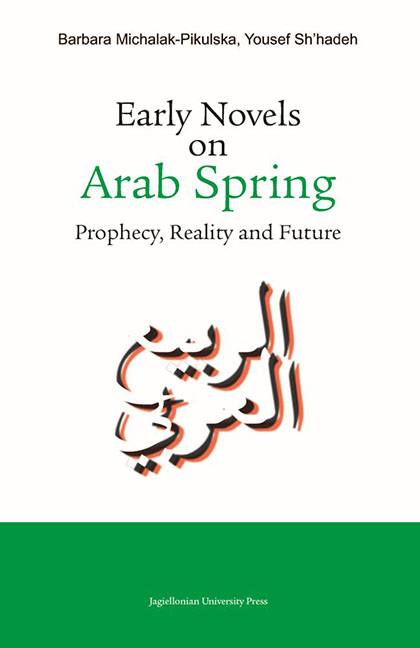Book contents
- Frontmatter
- Contents
- Introduction
- Part I Awakening of the Awareness of Subjugation – The Prophecy of the Spring of Nations in Arab Novels
- Part II At the Heart of the Arab Spring Events
- Part III The Future: The Spring Continues
- 17 Mu‘Taṣim Aš - Šā‘Ir : Uhzūǧat ar-raḥīl (A Song of Departure) and Fī intiẓār as-sulaḥfāt (Waiting for a Turtle)
- 18 Aḥmad ‘Abd Al - Malik : Al-Aqni‘a (Masks)
- 19 Ṭayba Aš - Šarīf Al - Idrīsī : Ḥaǧar min saqar (A Stone from Hell)
- 20 Amīra Aš - Širbīnī : ‘Itq (Liberation)
- 21 ‘ Izz Ad - Dīn Šukrī Fašīr : Bāb al-ẖurūǧ – risālat ‘Alī al-muf‘ama bi-bahǧa ġayr mutawaqqa‘a (The Gate to Leave – Ali’s Letter Filled with Unexpected Joy)
- Conclusion
- Bibliography
- Summary in Arabic
6 - Hišām al - Ḫašin : 7 ayyām fī at-Taḥrīr (7 Days on Tahrir Square)
Published online by Cambridge University Press: 13 October 2023
- Frontmatter
- Contents
- Introduction
- Part I Awakening of the Awareness of Subjugation – The Prophecy of the Spring of Nations in Arab Novels
- Part II At the Heart of the Arab Spring Events
- Part III The Future: The Spring Continues
- 17 Mu‘Taṣim Aš - Šā‘Ir : Uhzūǧat ar-raḥīl (A Song of Departure) and Fī intiẓār as-sulaḥfāt (Waiting for a Turtle)
- 18 Aḥmad ‘Abd Al - Malik : Al-Aqni‘a (Masks)
- 19 Ṭayba Aš - Šarīf Al - Idrīsī : Ḥaǧar min saqar (A Stone from Hell)
- 20 Amīra Aš - Širbīnī : ‘Itq (Liberation)
- 21 ‘ Izz Ad - Dīn Šukrī Fašīr : Bāb al-ẖurūǧ – risālat ‘Alī al-muf‘ama bi-bahǧa ġayr mutawaqqa‘a (The Gate to Leave – Ali’s Letter Filled with Unexpected Joy)
- Conclusion
- Bibliography
- Summary in Arabic
Summary
Hišām al-Ḫašin in the novel 7 ayyām fī at-Taḥrīr (7 Days on Tahrir Square) tries to convey the atmosphere of the revolution, its climate, depression and joy. The writer characterizes and assesses the reality that is unfolding before his eyes and the realism of the novel comes from its detailed descriptions of authentic events.
The author dedicates this novel to young revolutionaries who want freedom. In the foreword to the novel, he writes that:
this book is not about revolutionary events and certainly not about those who headed it; this book is about the emotions of the revolution and about those who stood on Tahrir Square, as they reached it separately at different moments, adequate to the degree of development of their emotions, but eventually united in love for the homeland and got rid of injustice.
The novel records events that took place on Tahrir Square. The author selects the most significant seven days of the Egyptian Spring, describing them in turn. The first chapter is entitled “Yawm al-iṯnayn 24 yanāyir 2011” (Monday, January 24, 2011), and it is set on the eve of the outbreak of the revolution. The penultimate chapter, entitled “Yawm al-ǧumu‘a 11 fibrāyir 2011” (Friday, February 11, 2011), takes place on the day of Mubarak’s departure from power. The novel is crowned with the ending titled “al-Bidāya” (Beginning). It seems that through this title the author wanted to indicate the commencement of a new stage in the history of Egypt.
The heroes of the novel represent different social strata of the Egyptian nation. Bāsim and his beloved Šīrīn are representatives of the young generation, of the Facebook users who were the initiators of the revolution and stimulated their countrymen to go out into the streets on January 25. Bāsim’s parents – Dr. Aḥmad and his wife – represent the older generation with conservative views that looks unfavorably at modern youth, perceiving the internet as a source of evil, debauchery and a waste of time. Ilhām is a simple girl who is getting married to the rich, already married businessman, ‘Abd al-Ḥamīd (it is zawāǧ ‘urfī – the wedding is given by the imam, but is not sanctioned in the office).
- Type
- Chapter
- Information
- Early Novels on Arab SpringProphecy, Reality and Future, pp. 31 - 39Publisher: Jagiellonian University PressPrint publication year: 2022

